Related Research Articles

A hymnal or hymnary is a collection of hymns, usually in the form of a book, called a hymnbook. They are used in congregational singing. A hymnal may contain only hymn texts ; written melodies are extra, and more recently harmony parts have also been provided.
The Christian Science Hymnal is a collection of hymns used in Christian Science church services including Sunday services and Wednesday evening testimony meetings, as well as in occasional informal hymn sings.

"Be Thou My Vision" is a traditional Christian hymn of Irish origin. The words are based on a Middle Irish poem that has traditionally been attributed to Dallán Forgaill.

"O for a Thousand Tongues to Sing" is a Christian hymn written by Charles Wesley. The hymn was placed first in John Wesley's A Collection of Hymns for the People Called Methodists published in 1780. It was the first hymn in every (Wesleyan) Methodist hymnal from that time until the publication of Hymns and Psalms in 1983.
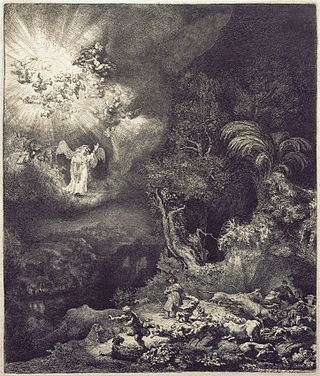
"It Came Upon the Midnight Clear", sometimes rendered as "It Came Upon a Midnight Clear", is an 1849 poem and Christmas carol written by Edmund Sears, pastor of the Unitarian Church in Wayland, Massachusetts. In 1850, Sears' lyrics were set to "Carol", a tune written for the poem the same year at his request, by Richard Storrs Willis. This pairing remains the most popular in the United States, while in Commonwealth countries, the lyrics are set to "Noel", a later adaptation by Arthur Sullivan from an English melody.

"Christ the Lord Is Risen Today" is a Christian hymn associated with Easter. Most of the stanzas were written by Charles Wesley, and the hymn appeared under the title "Hymn for Easter Day" in Hymns and Sacred Poems by Charles and John Wesley in 1739. The hymn eventually became well known for the "Alleluia" sung as a melisma after each line, which was added by an unknown author, probably to fit the commonly used hymn tune, "Easter Hymn". It remains a traditional processional hymn on Easter Sunday.

"Rock of Ages" is a popular Christian hymn written by the Reformed Anglican minister Augustus Toplady.

"Jesus Loves Me" is a Christian hymn written by Anna Bartlett Warner (1827–1915). The lyrics first appeared as a poem in the context of an 1860 novel called Say and Seal, written by her older sister Susan Warner (1819–1885), in which the words were spoken as a comforting poem to a dying child. The tune was added in 1862 by William Batchelder Bradbury (1816–1868). Along with his tune, Bradbury added his own chorus "Yes, Jesus loves me, Yes, Jesus Loves me..." After publication as a song it became one of the most popular Christian hymns in churches around the world, especially among children.
"For the Beauty of the Earth" is a Christian hymn by Folliott S. Pierpoint (1835-1917).

"All the Way My Savior Leads Me" is a Christian hymn with lyrics written in 1875 by Fanny J. Crosby (1820-1915) to a tune written by the Baptist minister Dr. Robert Lowry.
Charles Hutchinson Gabriel was an American composer and lyricist of gospel songs and gospel tunes. He is said to have written and/or composed between 7,000 and 8,000 songs, many of which are available in 21st century hymnals. He used several pseudonyms, including Charlotte G. Homer, H. A. Henry, and S. B. Jackson.
"What a Friend We Have in Jesus" is a Christian hymn originally written by preacher Joseph M. Scriven as a poem in 1855 to comfort his mother, who was living in Ireland while he was in Canada. Scriven originally published the poem anonymously, and only received full credit for it in the 1880s. The tune to the hymn was composed by Charles Crozat Converse in 1868.
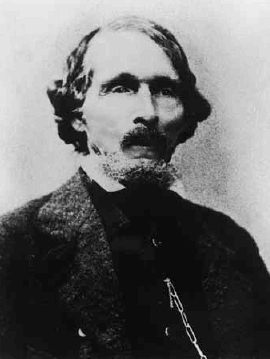
"Praise to the Man" is a poem written as a eulogy in verse for Joseph Smith. The poem's authorship is typically attributed to Latter Day Saint leader and hymn writer William W. Phelps. The poem was composed soon after Smith's death, and was later set to music and adopted as a hymn of the Church of Jesus Christ of Latter-day Saints. It was first published with no directly attached name in the church newspaper Times and Seasons in August 1844, approximately one month after Smith was killed. The hymn is still used in the LDS Church, as number 27 in its current hymnal.
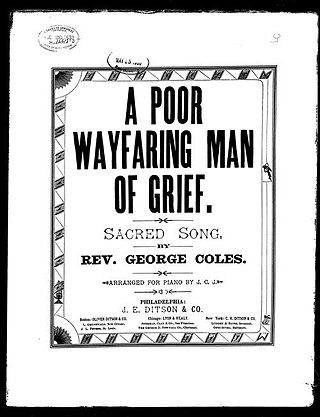
"A Poor Wayfaring Man of Grief" is a seven-stanza poem written in 1826 by James Montgomery. The words of the poem have since been adopted as a Christian hymn.
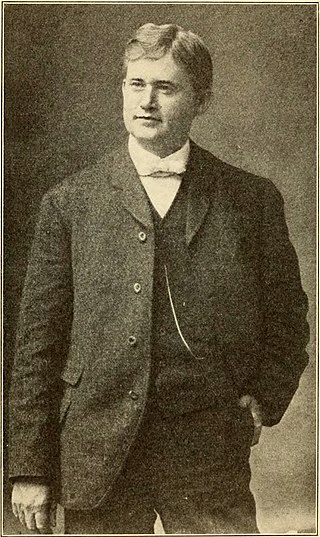
Charles Davis Tillman —also known as Charlie D. Tillman, Charles Tillman, Charlie Tillman, and C. D. Tillman—was a popularizer of the gospel song. He had a knack for adopting material from eclectic sources and flowing it into the mix now known as southern gospel, becoming one of the formative influences on that genre.
Ebenezer also known as Ton-y-Botel is a famous Welsh hymn tune composed by Thomas John Williams A.T.S.C. (1869–1944) and extracted from the second movement of his anthem "Goleu Yn Y Glyn".
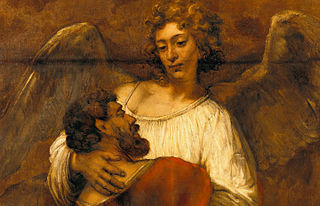
"Wrestling Jacob", also known by its incipit, "Come, O thou Traveller unknown", is a Christian hymn written by Methodist hymn writer Charles Wesley. It is based on the biblical account of Jacob wrestling with an angel, from Genesis 32:24-32, with Wesley interpreting this as an analogy for Christian conversion. First published in 1742, it has been included in every Methodist hymnbook since 1780. In its original form, it had fourteen stanzas, but it is rarely sung in its entirety. The hymn is commonly described as one of Charles Wesley's greatest compositions, with the hymn writer Isaac Watts quoted as saying that "that single poem, Wrestling Jacob, was worth all the verses he himself had written".
"Crown Him with Many Crowns" is an 1851 hymn with lyrics written by Matthew Bridges and Godfrey Thring and sung to the tune 'Diademata' by Sir George Job Elvey. The hymn appears in many hymnals.
Face to Face with Christ my Saviour is a hymn by American writer Carrie Breck, written in 1898. It is Breck's most well-known composition.
References
- ↑ "Once to Every Man and Nation". Hymnary.org.
- ↑ "Asking the Clergy: Spiritual leaders' political leanings". Newsday. 24 January 2020.
- ↑ Mason, David V. (May 8, 2018). "Changing with the times - faith requires some flexibility". Houston Chronicle.
- 1 2 "Once To Every Soul And Nation". Discipleship Ministries.
- ↑ Baptist Hymnal. Convention Press. 1956. p. 418.